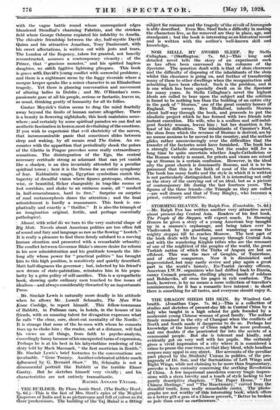NOR SHALL MY SWORD SLEEP. • By Stella -.Callaghan. (Skeffington.
7s. 1:W4—This long and detailed novel tells the story of an experiment such as has often been canvassed in the columns of the Spectator. The question dealt with is that of slum clearance and the difficulty of disposing of the inhabitants of the slum whilst this clearance is going on, and further of transferring many of them to other dwellings when the reorganization and rebuilding have been effected. Such is the problem, and it is one which has been specially dwelt on in the Spectator for many years. In Stella Callaghan's novel the highest ideals are called to bear upon the subject and the solution is found to be nothing less than the building of an entire city in the park of " Stornes," one of the great country houses of England. The owner, Rex Hollaford, inherits Starnes about half-way through the book, and proceeds to put the idealistic project which he has formed with two friends into instant execution. His wife, who is a soulless and self-indul• -gent Society woman, leaves him • but her desertion is the least' of his difficulties. The inhabitants of Cainnier's End, 'the slum from which the revenue of Stornes is derived, are by • no means anxious to be moved to the country, and the author .glides rather unconvincingly over the difficulties that the transfer, of the factories must have furnished. -The book has a strongly Catholic atmosphere, but the reader Will for a long time be quite uncertain whether Anglo-Catholicism or the Roman variety is meant, for priests and vicars are mixed up at Stornes in a certain confusion. However, in the ideal city the great church is dominantly Roman, and it is to be presumed that this is the faith of most of the characters, The book has many faults and the style in which it is written is not particularly distinguished, but it is interesting not only as the story of the carrying out of an ideal, but as a picture of contemporary life during the last fourteen years. The figures of the three friends the Triangle an they are called —are well drawn and that of Tony Bingley, who becomes a
priest, extremely attractive. •


































 Previous page
Previous page